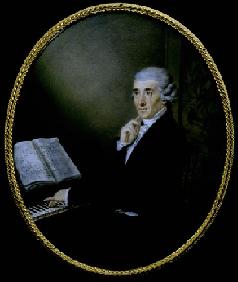
On May 31, 1809, Haydn died of exhaustion at his house in Vienna. He is regarded by some as father of the symphony and the string quartet, and although he did not originate them, he took both genres from their beginnings to a high level of sophistication. His style of development laid the foundations for the larger structures of Beethoven.
Haydn wrote the Kaiserhymne to Emperor Franz ll when Austria was endangered by France. “Gott erhalte Franz den Kaiser” was first performed on the Emperor’s birthday, February 12, 1797. It proved popular, and came to serve unofficially as Austria’s first national anthem. The melody is also the second movement of one of Haydn’s “Emperor Quartet” and was later used in Das Lied der Deutschen, which is still Germany’s national anthem. Its lyrics adapted through the years. This is the later version.
According to his servant Johann Elssler, Haydn was especially fond of it and it was the last music he ever played. It was used for official purposes in Austria until it was abolished along with the monarchy in 1919.

| Gott erhalte Franz den Kaiser | |
|
Gott erhalte Franz den Kaiser,
Unsern guten Kaiser Franz, Hoch als Herrscher, hoch als Weiser, Steht er in des Ruhmes Glanz; Liebe windet Lorbeerreiser Ihm zum ewig grünen Kranz. Gott erhalte Franz den Kaiser, Unsern guten Kaiser Franz! Über blühende Gefilde Reicht sein Scepter weit und breit; Säulen seines Throns sind milde, Biedersinn und Redlichkeit, Und von seinem Wappenschilde Strahlet die Gerechtigkeit. Gott erhalte unsern Kaiser, Unsern guten Kaiser Franz! |
Sich mit Tugenden zu schmücken,
Achtet er der Sorgen werth, Nicht um Völker zu erdrücken Flammt in seiner Hand das Schwert: Sie zu segnen, zu beglücken, Ist der Preis, den er begehrt, Gott erhalte unsern Kaiser, Unsern guten Kaiser Franz! Er zerbrach der Knechtschaft Bande, Hob zur Freiheit uns empor! Früh’ erleb’ er deutscher Lande, Deutscher Völker höchsten Flor, Und vernehme noch am Rande Später Gruft der Enkel Chor: Gott erhalte unsern Kaiser, Unsern guten Kaiser Franz! |